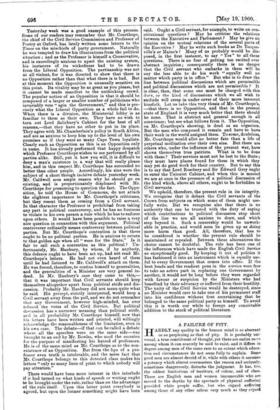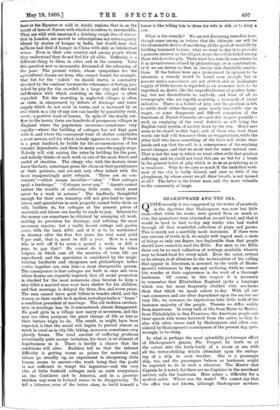A FAILURE OF PITY. H ARDLY any quality in the human
mind is so aberrant or so perplexing as that of pity. It is probably uni- versal, a true constituent of thought, yet there are entire races among whom it can scarcely be said to exist, and it differs in degree among men of the same race to an extent which educa- tion and circumstances do not seem fully to explain. Seine good men are almost devoid of it, while with others it assumes a potency which almost overmasters the reason and seriously, sometimes dangerously, disturbs the judgment. It has, too, the oddest limitations of territory, of colour, and of class. There are English men and women innumerable who are moved to the depths by the spectacle of physical suffering provided white people suffer, but who regard suffering among those of any other colour very much as they regard heat at the Equator or cold in Arctic regions, that is, as the result of laws of Nature with which it is useless to intermeddle. They are wild with emotion if a drinking rough dies of starva- tiOn in London, are moved to subscriptions not extravagantly liberal by stories of hunger in India, but would ,hear that millions had died of hunger in China with only an intellectual wince. Even in their own country and among people whom they understand they do not feel for all alike. Suffering is a different thing to them in cities and in the country. Take this question now so incessantly discussed of the rehousing of the poor. The, present writer, whose sympathies for the agricultural classes are keen, who cannot forget, for example, that but for the " yokels " we should starve, is constantly shocked by the contrast between the vehemence of feeling pro- voked by pity for the crowded in a large city, and the total indifference with which crowding in the villages is often regarded. Yet the crowding in neglected villages is often as close, is exasperated by defects of drainage and water supply which do not exist in towns, and is increased by an evil which in a city of any size can hardly by possibility exist, —viz., a positive want of houses. In spite of the steady out- flow to the towns, there are hundreds of prosperous villages in England where the population increases—sometimes very rapidly—where the building of cottages has not kept pace with it, and where the consequent want of shelter constitutes a most serious evil for which nobody appears to care. If there is a great landlord, he builds for the accommodation of his tenants' dependants, and there in many cases the supply stops. Nobody will risk raising the rates by building for the poor, and nobody thinks of such work as one of the most direct and useful of charities. The clergy, who with the doctors alone know the facts, sometimes press the claim on their parishioners or their patients, and are met very often indeed with the most exasperatingly quiet refusals. "There are no con- venient "—which means invisible—" sites." "New cottages spoil a landscape." "Cottages never pay." "Agents cannot endure the trouble of collecting little rents, which must never be a week in arrears." The landlords, thoughtful enough for their own tenantry, will not give land to specu- lators, and speculators in such property cannot bribe them as villa builders do, for cottages at the present prices of materials and labour can hardly be made to pay. Interest for the money can sometimes be obtained by scamping all work, making no provision for drainage, and refusing the most necessary repairs; but a really decent cottage and garden costs, with the land, £300, and if it is to be maintained in decency after the first five years the rent must yield 7 per cent., that is, must be 221 a year. How is a man who is well off if he earns a pound a week, or 252 a year, to pay that ? He cannot do it unless he takes lodgers, in which case all the miseries of town life are reproduced, and the speculator is considered by the neigh- bouring landlords and clergymen and philanthropic ladies —who together can ruin him—a most disreputable person. The consequence is that cottages are built in ones and twos where* dozens are urgently required, that all social promotion is checked for the most numerous class because to keep a nice billet a married man must have shelter for his children, and that marriage is delayed for three, five, and seven years. The men cannot leave good billets to wander afield, and the women, to their credit be it spoken, nowadays make a " home " a condition precedent of marriage. The old reckless careless- ness in marriage has, be it remembered, almost disappeared. No good girls in a village now marry at seventeen, and the men too often postpone the great change of life as late as their betters begin to do. The result, as might have been expected, is that the social evil begins to prevail almost as much in rural as in city life, taking, moreover, sometimes very ghastly forms. The total amount of suffering produces occasionally quite savage irritation, for there is an element of hopelessness in it. There is hardly a chance that the conditions will alter. Builders tell us that the interest difficulty is getting worse as prices for materials. and labour go steadily up, no experiment in cheapening little houses seems to answer—the truth being that the profit is not sufficient to tempt the ingenious—and the very idea of little freehold cottages such as exist everywhere on the Continent and in America, and in a poverty- stricken way even in Ireland, seems to be disappearing. To tell a labourer, even of the better class, to build himself a
house is like telling him to dress his wife in silk, or to keep a
COW.
What is the remedy? We are not discussing remedies here, though some among us believe that the ultimate one will be the abominable device of sacrificing all the good of rural life by building tenement houses ; what we want to-day is to provoke a genuine interest in the subject, to see the evil included among those which evolve pity. There must be a remedy somewhere, be it in inventiveness stirred by philanthropy, or in combination, or if we are driven to that, in charity and charitable associa- tions. If the failure were once pronounced by opinion to be inhuman, a remedy would be found soon enough, but at present men's consciences are not stirred, and an inadequate supply of little houses is regarded as an economic fact, to be regretted, no doubt, like the unprofitableness of poultry farm- ing, but not discreditable to anybody, and least of all to townspeople, who are rapidly acquiring a monopoly of social initiative. There is a failure of pity, and the question is left to settle itself either through some nearly impossible rise in wages, or some dangerous and difficult expansion of the functions of Parish Councils, or—and this is quite possible— such an emptying of the rural districts as will bring the English rural system of society down by the run. Men's ears seem to be closed to this topic, and of those who read these words one half will denounce them as exaggerations, while the other half who know something of the facts will shake their heads and say that the evil is a consequence of far-reaching social changes, and that we must wait for some natural cure. That is not the way in which we treat other evils that produce suffering, and we could not treat this one so but for a break in the general habit of pity which is to us as perplexing as it is vexatious. Why do we care so much if the unskilled work- man of the city is badly hOused, and care so little if the ploughman, by whose sweat we all draw breath, is not housed at all ? The latter is the better man, and the more valuable to the community at large.







































 Previous page
Previous page